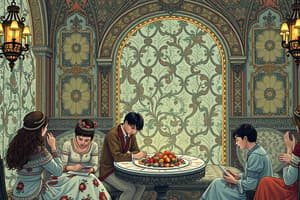Podcast
Questions and Answers
Role as Expectation refers to the rights, duties, and obligations an individual has while occupying a ______.
Role as Expectation refers to the rights, duties, and obligations an individual has while occupying a ______.
status
Role Conflict arises when an individual encounters conflicting demands from his two or more ______.
Role Conflict arises when an individual encounters conflicting demands from his two or more ______.
statuses
Gender differences are a function of cultural patterns which prescribe different expectations and norms of behavior for ______ and girls.
Gender differences are a function of cultural patterns which prescribe different expectations and norms of behavior for ______ and girls.
boys
A status that is assigned to an individual from birth is known as ______ status.
A status that is assigned to an individual from birth is known as ______ status.
Role Set refers to the individual's repertoire of performances towards a variety of others while he/she occupies a given ______.
Role Set refers to the individual's repertoire of performances towards a variety of others while he/she occupies a given ______.
Role as Performance refers to how the individual actually ______ while occupying the status.
Role as Performance refers to how the individual actually ______ while occupying the status.
Society employs various forms of social control depending on the ______.
Society employs various forms of social control depending on the ______.
In primitive societies, beliefs and ______ are sufficient for social control.
In primitive societies, beliefs and ______ are sufficient for social control.
In a relationship, the man may experience ______ if he feels torn between his feelings for the woman and the expectations of his family.
In a relationship, the man may experience ______ if he feels torn between his feelings for the woman and the expectations of his family.
Formal sanctions can include rewards such as promotions or ______ for exceptional performance in a job.
Formal sanctions can include rewards such as promotions or ______ for exceptional performance in a job.
The process through which society conveys expectations about gender behaviors is known as ______.
The process through which society conveys expectations about gender behaviors is known as ______.
A person's ______ is influenced by their family background, social class, and life experiences.
A person's ______ is influenced by their family background, social class, and life experiences.
The expected behavior associated with a particular status is referred to as a ______.
The expected behavior associated with a particular status is referred to as a ______.
Negative psychological sanctions can manifest in forms such as ______ and social rejection.
Negative psychological sanctions can manifest in forms such as ______ and social rejection.
Honoring cultural standards and expectations within a society is crucial for maintaining social ______.
Honoring cultural standards and expectations within a society is crucial for maintaining social ______.
Mores can be described as folkways that are integrated with ______ values, shaping societal behavior.
Mores can be described as folkways that are integrated with ______ values, shaping societal behavior.
Susie observes her schoolmates to modify her ______ and behavior.
Susie observes her schoolmates to modify her ______ and behavior.
A married man may still look to his ______ friends as a reference group.
A married man may still look to his ______ friends as a reference group.
Reference groups help us identify social ______ and guide our behavior.
Reference groups help us identify social ______ and guide our behavior.
Most reference groups are considered ______ because they are based on shared interests.
Most reference groups are considered ______ because they are based on shared interests.
Formal reference groups have a specific ______ or mission.
Formal reference groups have a specific ______ or mission.
Embracing the norms of a reference group can lead to social ______.
Embracing the norms of a reference group can lead to social ______.
Those who do not express the expected norms of their reference groups might be seen as ______.
Those who do not express the expected norms of their reference groups might be seen as ______.
A social network is a social structure that exists between ______ or organizations.
A social network is a social structure that exists between ______ or organizations.
Flashcards
Role as Expectation
Role as Expectation
The rights, duties, and obligations of a person in a social position (status).
Role as Performance
Role as Performance
How a person actually acts in a social position (status).
Role Conflict
Role Conflict
When a person faces conflicting demands from different social positions.
Role Set
Role Set
Signup and view all the flashcards
Status
Status
Signup and view all the flashcards
Ascribed Status
Ascribed Status
Signup and view all the flashcards
Achieved Status
Achieved Status
Signup and view all the flashcards
Social Control
Social Control
Signup and view all the flashcards
Pamamanhikan
Pamamanhikan
Signup and view all the flashcards
Mores
Mores
Signup and view all the flashcards
Laws
Laws
Signup and view all the flashcards
Sanctions
Sanctions
Signup and view all the flashcards
Informal Sanctions
Informal Sanctions
Signup and view all the flashcards
Formal Sanctions
Formal Sanctions
Signup and view all the flashcards
Role
Role
Signup and view all the flashcards
Reference Group
Reference Group
Signup and view all the flashcards
Informal Reference Group
Informal Reference Group
Signup and view all the flashcards
Formal Reference Group
Formal Reference Group
Signup and view all the flashcards
Social Norms
Social Norms
Signup and view all the flashcards
Social Network
Social Network
Signup and view all the flashcards
Social Acceptance
Social Acceptance
Signup and view all the flashcards
Reference group functions
Reference group functions
Signup and view all the flashcards
Outcasts/Revolutionaries
Outcasts/Revolutionaries
Signup and view all the flashcards
Study Notes
Enculturisation and Socialisation
- Enculturisation is the process of acquiring knowledge, skills, attitudes, and values to function in society.
- Socialisation is the process of modifying behaviour to align with group expectations.
- Human development progresses through stages: vegetative (focus on survival), animal (driven by basic needs), and human (development of personality).
Social Norms and Values
- Social norms are standards of behaviour defining right and wrong actions.
- Folkways are customary practices with little social consequence for violation.
- Mores have strong moral and ethical implications.
- Laws are formalized norms enforced by authority.
- Sanctions are penalties for norm violations, ranging from informal (social disapproval) to formal (legal punishments).
Forms of Sanctions
- Informal sanctions involve social pressure (gossip, disapproval, support).
- Formal sanctions include academic awards, promotions, and legal punishments.
Application of Sanctions
- Physical sanctions involve pain or pleasure.
- Psychological sanctions affect feelings and emotions (compliments, insults).
Status and Role
- Status is a social position (ascribed or achieved).
- Ascribed status is assigned at birth, while achieved status is earned.
- Role is the behaviour expected of a particular status.
- Role conflict arises from conflicting expectations of multiple statuses.
- Role set is the collection of roles associated with a particular status.
Socialization for Sex Roles
- Societies categorize individuals based on gender.
- Gender differences are culturally determined.
- Societal norms prescribe varying expectations and behaviours for males and females.
- Gender roles stem from cultural beliefs and norms.
Social Control
- Social control varies across cultures.
- In primitive societies, beliefs and superstition suffice.
- In modern societies, formal agencies (like police) play a significant role.
- Direct control (family, peers) and indirect control (traditions, customs) are common.
- Positive sanctions (praise, recognition) and negative sanctions (criticism, punishment) motivate conformity.
Deviance
- Deviance is the recognized violation of cultural norms.
- Cultural norms vary widely, and actions considered deviant by one group may be acceptable in another.
Modes of Adaptation
- Conformity (accepting goals and means).
- Innovation (accepting goals, rejecting means).
- Ritualism (rejecting goals, accepting means).
- Retreatism (rejecting goals and means).
- Rebellion (rejecting goals and means, substituting alternatives).
Social Pathology
- Biological pathology: Deviance stems from physical illness or malfunction.
- Cultural conflict: Deviance occurs when two belief systems clash.
- Labeling theory: Deviance is defined by social reaction.
- Value conflict: Deviance is viewed as violating group values.
Common Forms of Deviance
- Criminal behaviour, drug addiction, and mental illness are common.
Citizenship
- Citizenship is membership in a political community, including rights and responsibilities.
- The rights of citizenship are enshrined in the Constitution.
- Civic responsibility includes abiding by laws, supporting the community, and respecting others.
Groups
- Primary groups (family, close friends) engage in frequent interaction.
- Secondary groups (colleagues, acquaintances) involve limited interaction (often based on needs).
- Groups are classified by social ties, self-identification, purpose, and organization.
- Reference groups are groups used as a standard for comparison, whether or not individuals are members of the group.
Social Networks
- Social networks link individuals and organizations.
- Networks exist across numerous levels (family, national).
- Networks are important for solving problems, achieving goals, and navigating society.
- Modes of adaptation range from conforming to rebellions.
Kinship
- Kinship ties can be based on blood or marriage relationships, or based on broader ritualistic norms (like godparenthood)..
- Kinship shapes family structure and dynamics within a society.
- Variation exists in family patterns based on origin, descent, residence, organization, and kinship.
- Politics often play a role in shaping kinship relationships, and kinship often influences political outcomes.
Studying That Suits You
Use AI to generate personalized quizzes and flashcards to suit your learning preferences.
Related Documents
Description
Explore the concepts of enculturisation and socialisation in this insightful quiz. Learn about social norms, values, and the stages of human development while testing your understanding of these essential sociological principles. Delve into the significance of sanctions and their impact on societal behavior.




